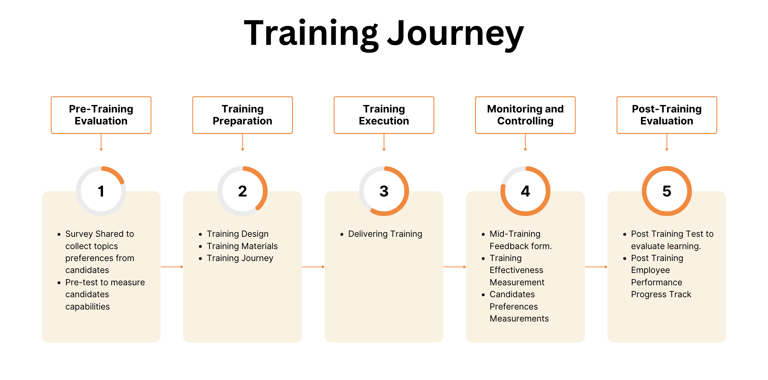Empowering Journey: The Strength of Training from Start to Finish
Blog post description.
Abdul Aziz Shaghlel
12/28/20233 min read


In today's fast-paced and ever-evolving world, training has become an indispensable tool for individuals and organizations to stay competitive and adaptable. Whether it's upskilling employees, enhancing personal growth, or preparing for new challenges, the journey of training encompasses a series of crucial steps that lead to growth and development. This journey begins with pre-assessment and questionnaire, followed by designing training materials, content, and activities, delivering the training, monitoring and controlling the execution, and concluding with post-training assessment. Each of these stages plays a pivotal role in the efficacy of the training process.
1. Pre-Assessment and Questionnaire
The first step in any effective training program is understanding the current knowledge, skills, and needs of the participants. A pre-assessment helps trainers identify knowledge gaps, learning styles, and training goals. It allows for a tailored training approach, ensuring that participants get what they need rather than generic information that may not be relevant.
Questionnaires, interviews, and skill assessments can be used to gather this information. This step not only guides the subsequent stages but also motivates participants by demonstrating that their unique needs are being considered.
2. Designing Training Materials, Content, and Activities
Once the pre-assessment is complete, the next crucial step is designing the training program itself. This includes creating training materials, content, and activities that align with the participants' needs and goals. The training materials must be engaging, accessible, and organized to promote effective learning.
Curriculum design, development of training modules, and selection of appropriate training methods and technologies are all part of this stage. The content should be relevant, up-to-date, and presented in a clear and engaging manner to keep participants motivated and focused.
3. Delivering Training
The training phase is where the action takes place. Effective delivery is essential for transferring knowledge and skills to the participants. Trainers must create a supportive learning environment, encourage active participation, and adapt to the diverse learning styles and needs identified during the pre-assessment phase.
The method of delivery may vary, from traditional classroom training to e-learning platforms, workshops, or mentorship programs. Effective trainers keep participants engaged, address questions and concerns, and ensure that the training objectives are met.
4. Monitoring and Controlling Training Execution
Monitoring and controlling the training process is an often-overlooked but critical aspect of training effectiveness. It involves regular assessment and feedback, ensuring that the training is proceeding according to plan. During this phase, trainers and training coordinators can make necessary adjustments to meet evolving needs and goals.
Feedback mechanisms such as surveys, quizzes, and real-time assessments help identify areas where participants might be struggling or where the training program itself may require modifications. This adaptive approach improves the overall effectiveness of the training.
5. Post-Training Assessment
The journey concludes with a post-training assessment, which evaluates the training program's impact and effectiveness. This assessment is an opportunity to measure the knowledge and skills acquired during the training, as well as the application of new learning to real-world situations.
Post-training assessments can take various forms, such as exams, projects, and self-assessments. The results help trainers and organizations gauge the return on investment and the overall success of the training program. Additionally, they serve as a basis for future improvements and enhancements to subsequent training initiatives.
In conclusion, the journey from pre-assessment to post-training assessment is a powerful process that can transform individuals and organizations. It is a structured approach that ensures training efforts are customized, engaging, and effective. By understanding the needs of participants, designing materials and content that are relevant and engaging, delivering training with excellence, monitoring and adjusting the process as necessary, and evaluating the outcomes, the power of training is harnessed to foster personal and professional growth. In a constantly changing world, effective training is not a luxury; it's a necessity for staying competitive and achieving success.
